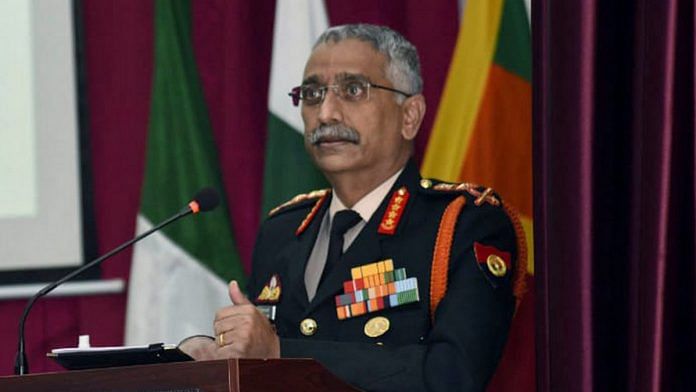
New Delhi: China has realised that its habit of creeping forward and achieving its aim without firing a shot or suffering casualties will not work with India, said Army chief General M.M. Naravane Wednesday.
“China has been in the habit of creeping forward, making small incremental changes…and because of these small incremental moves, which has never been contested, it has been able to achieve its aim without firing a shot or suffering casualties. We have shown that this strategy will not work with us and every move will be met resolutely,” said Gen Naravane, while addressing a webinar.
Speaking for the first time on the issue since India and China completed the disengagement process at the Pangong Tso in Ladakh last week, Naravane said that whatever has been achieved so far was “very good”.
He credited the disengagement to the approach taken by entire government machinery —political, diplomatic and economic besides the military — and advice by National Security Advisor Ajit Doval.
“We (government machinery) were all in it together. We had our plan chalked out which we had discussed what should be the way forward. Whatever has panned out has happened as a result of that,” said Naravane at a webinar organised by Vivekananda International Foundation (VIF), a New Delhi-based think tank.
He added: “What we have achieved so far is very good. Having a number of meetings…the advice given by the NSA came handy and his insight into strategic matters, helped us.”
He further noted that the disengagement was a “win-win” situation for both India and China, and for any agreements to last both sides should feel that they have achieved something.
“To that end, this is a good outcome of the 10 rounds of talks,” the Army chief said, referring to the 10 rounds of Corps Commander level talks that were held between India and China.
Army continues to be cautious and wary
During his address, Gen Naravane also noted that while the disengagement process has been completed, the Army continues to be cautious and wary.
“There is a trust deficit and unless it is removed, we will continue to be wary and watchful of all kinds of movements. At end of the day, we have achieved a lot.”
He said the disengagement agreement signed with China is premised on the fact that it will be observed in letter and spirit, as is the case with any agreement signed with another country.
“We will trust but we will verify. We have put our systems in place to ensure there is no re-occupation of the heights (southern and northern banks). It is part of the agreement and we can only hope that PLA will adhere to it in toto,” said Naravane.
He further highlighted that certain issues remain pending between the two countries, and the Army had strategies in place for them.
“We have our strategies in place for that. Do we have anything to negotiate? Yes, we definitely have, but I can’t say what those strategies will be, to again come out with a favourable outcome.”
Also read: India, China discuss 4 friction points, including Demchok, at Corps Commander talks
China’s ‘salami slicing’
The Army chief also spoke about China’s tactics of creeping with small incremental changes without any casualty or firing a shot. He noted that China has been similarly creeping forward in the South China Sea.
This tactic by China is known as ‘salami slicing’ in the strategic community and refers to the Chinese taking over territory inch by inch over years.
In September 2017, then Army chief and present Chief of Defence Staff General Bipin Rawat had cautioned against this.
“Salami slicing, taking over territory in a very gradual manner, testing our limits of threshold is something we have to be wary about and remain prepared for situations emerging, which could gradually emerge into conflict…,” Rawat had said.
According to Naravane, even after disengagement the military is prepared for a two-and-a-half front war.
“These are threats in being. Whether they manifest or not…We should prepare for the worst but hope for the best,” he said, adding that plans are in place to defend the primary and secondary front.
The Army chief also said that over the years, India has focused primarily on the western front than the northern front but this will change now.
Naravane further noted that there was “no overt sign” of any collusion between Pakistan and China during the Ladakh stand-off and whatever they were doing, they continued to do.
“There was no large mobilisation that would say any help is being given,” he said.
He added that the Ladakh stand-off showed India’s resolve in maintaining its interest foremost.
On India’s relationship with China going forward, the Army chief said, “Our relationship with China would develop along the road that we wish to develop. We will like to have peace and tranquility on the border and all other engagement will continue… nobody wants an unsettled border.”
Naravane also highlighted that India wants peaceful ties with all neighbours and stressed on the need to have settled borders.
Also read: How financial powers to command heads will help Army, Navy, IAF
